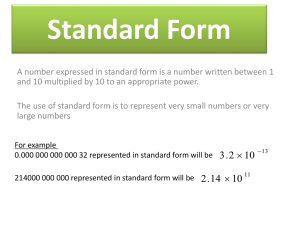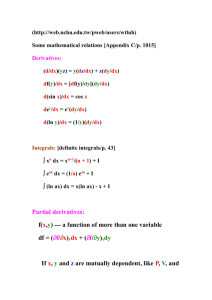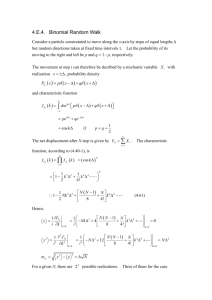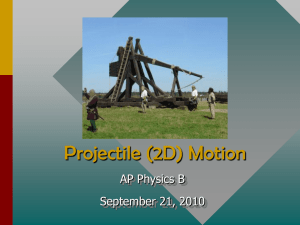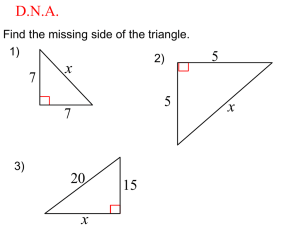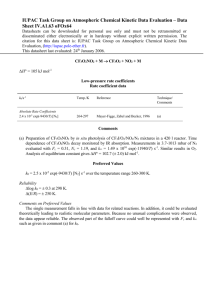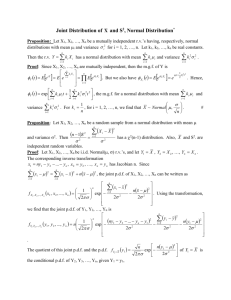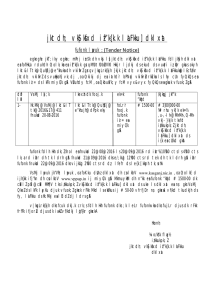DOCX
advertisement
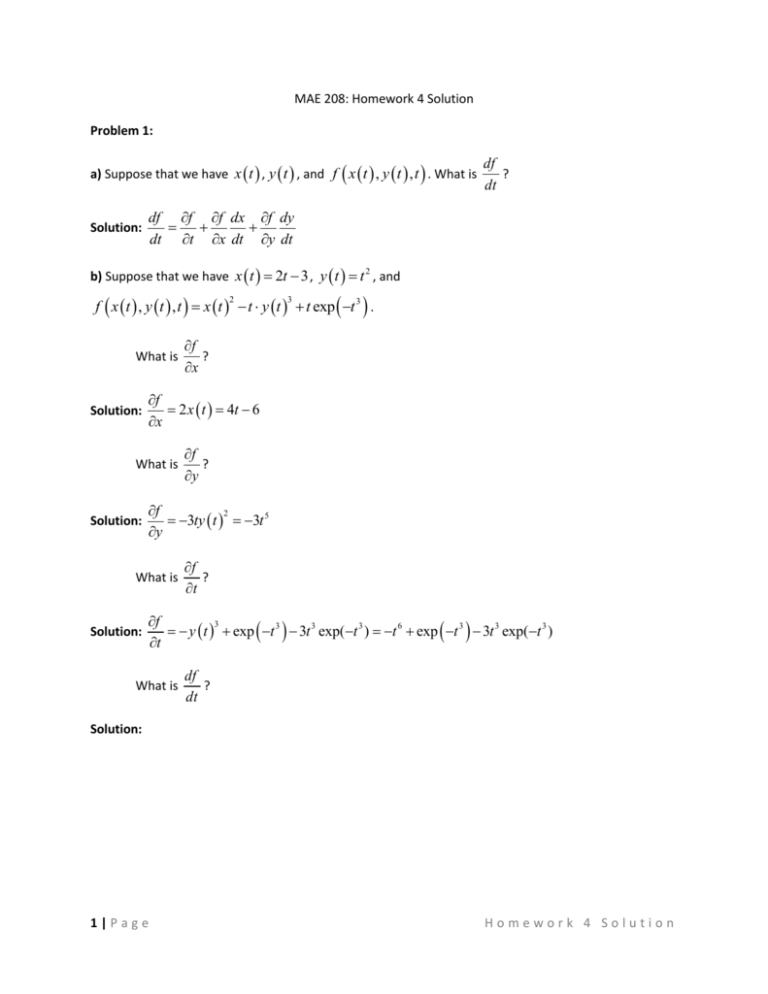
MAE 208: Homework 4 Solution Problem 1: a) Suppose that we have x t , y t , and f x t , y t , t . What is Solution: df ? dt df f f dx f dy dt t x dt y dt b) Suppose that we have x t 2t 3 , y t t 2 , and f x t , y t , t x t t y t t exp t 3 . 2 What is Solution: f ? y f 2 3ty t 3t 5 y What is Solution: f ? x f 2 x t 4t 6 x What is Solution: 3 f ? t f 3 y t exp t 3 3t 3 exp(t 3 ) t 6 exp t 3 3t 3 exp(t 3 ) t What is df ? dt Solution: 1|Page Homework 4 Solution df f f dx f dy dt t x dt y dt t 6 exp t 3 3t 3 exp t 3 4t 6 x t 3t 5 y t t 6 exp t 3 3t 3 exp t 3 4t 6 2 3t 5 2t t 6 exp t 3 3t 3 exp t 3 8t 12 6t 6 7t 6 exp t 3 3t 3 exp t 3 8t 12 c) Suppose that we have x , t x* t t , y , t y* t t , and some function f x , t , y , t , t . What is df ? d Solution: df f f dx f dy d x d y d df f f 0 t t d x x What is df ? d Solution: df f f dx f dy d x d y d df f f 0 t t d y y What is df ? dt Solution: df f f dx f dy dt t x dt y dt df f f * f * x t t y t t dt t x y 2|Page Homework 4 Solution What is Solution: f ? f 0 Problem 15-7: The total impulse is found by integrating the forces with respect to time (area under the curves). a) b) I 4 3 0 4 6 3 0.5 8 4 6 3 0.5 8 0 10 6 I 46 lb s I 6 8 0 0.5 6 0 10 8 I 54 lb s Problem15-24: The net forces on the block are: F x F2 4F1 Applying the principle of impulse and momentum: mv1 Fx dt mv2 40 1.5 10 2 0 20 4 2 40 6 4 4 30 4 0 10 6 4 40v2 v2 12.0 m / s Problem 15-53: We can apply conservation of energy to the crate, but note that this speed is the speed of the crate relative to the ramp. T1 U1 T2 U 2 0 mC g 3.5sin 30o 1 1 mC vC2 mR vR2 ,2 2 2 1 1 1 0 mC g 3.5sin 30o mC vC2 , x mC vC2 , y mR vR2 ,2 2 2 2 (1) We can relate the velocity of the crate and the ramp using the relative velocity: 3|Page Homework 4 Solution vC v R v C / R vR i vC / R cos 30o i vC / R sin 30o j vC , x vC / R cos 30o vR (2) vC , y vC / R sin 30o Applying conservation of momentum in the x direction, we get: mC vC ,1 mR vR ,1 mC vC ,2 mR vR ,2 0 mC vC ,2 mR vR ,2 Substituting for the relative velocity we have: 0 mC vC / R cos 30o vR,2 mR vR,2 (3) Solving (1), (2), and (3) for vR ,2 and vC / R : vC / R 6.36 m / s vR 1.1 m / s vC v R vC / R cos 30o vC / R sin 30o 2 2 5.43 m / s Problem 15-67: We need to first find the velocity of the block right after impact. Applying conservation of momentum and using the coefficient of restitution, we have: mAvA,1 mB vB ,1 mAvA,2 mB vB ,2 2 4 2vA,2 20vB ,2 e (4) vB ,2 v A,2 v A,1 vB ,1 0.8 vB ,2 v A,2 (5) 4 Solving (4) and (5) yields: vA,2 2.545 m / s vB ,2 0.6545 m / s Applying conservation of energy on the block after impact, we get: 4|Page Homework 4 Solution T1 U1 T2 U 2 1 2 mvB ,2 0 0 mgh 2 vB2 ,2 0.65452 h 0.0218 m 2g 2 9.81 Problem 15-83: Note that in this problem we do not have a coefficient of restitution. We know the final directions of the velocities, we just don’t know the magnitudes. Conservation of momentum is a vector equation, which gives us two different equations in this case. Two equations, two unknowns. Applying conservation of momentum along both axes: mAvAx ,1 mB vBx ,1 mAvAx ,2 mB vBx ,2 4 0.5 0.8sin 30o vA,2 cos 45o vB ,2 cos 30o 5 (6) mAvAy ,1 mB vBy ,1 mAvAy ,2 mB vBy ,2 3 0.5 0.8cos 30o vA,2 sin 45o vB ,2 sin 30o 5 (7) Solving (6) and (7) yields: vA,2 0.766 ft / s vB ,2 0.298 ft / s 5|Page Homework 4 Solution
